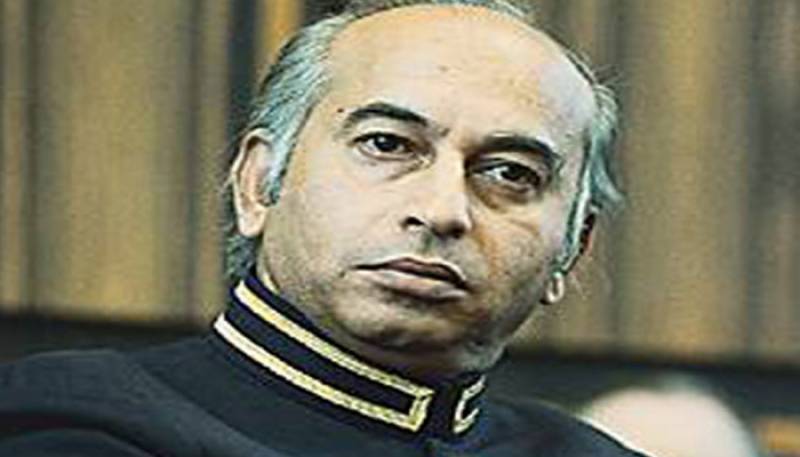Islamabad (Web Desk): The Supreme Court (SC) on Tuesday adjourned the hearing of presidential reference against controversial death sentence awarded to Pakistan Peoples Party (PPP) founder and former premier Zulfikar Ali Bhutto till the second week of January.
A nine-member larger bench of the SC, headed by Chief Justice of Pakistan (CJP) Qazi Faez Isa and comprising Justice Sardar Tariq Masood, Justice Mansoor Ali Shah, Justice Yahya Afridi, Justice Aminud Din Khan, Justice Jamal Khan Mandokhail, Justice Muhammad Ali Mazhar, Justice Syed Hasan Azhar Rizvi and Justice Musarrat Hilali resumed hearing the long-pending reference.
On April 2, 2011, then-president Asif Ali Zardari approached the apex court through a presidential reference under Article 186 of the Constitution of Pakistan to seek its opinion on revisiting the trial of the PPP founder.
It was filed before the top court under Article 186 (1 and 2) of the Constitution, which empowers the president to refer any question of public importance to the Supreme Court to seek its opinion on an issue.
The reference was last heard by an 11-judge panel, headed by then chief justice of Pakistan Iftikhar Muhammad Chaudhry, in Jan 2012.
The last hearing of the reference took place on November 11, 2012.
Ahead of the hearing today, Pakistan Peoples Party (PPP) Chairman Bilawal Bhutto-Zardari, his father Asif Ali Zardari and other senior party leaders arrived at the apex court.
On Monday, Bilawal moved the Supreme Court of Pakistan seeking a live broadcast of the reference.
In his civil miscellaneous application, the PPP chief had urged the court to allow the live telecast of the hearing "so that the whole of Pakistan could hear it".
He had also voiced his expectation from the chief justice to "rectify constitutional mistakes".
Attorney General for Pakistan (AGP) Mansoor Usman Awan represented the federal government in the reference, while Farooq H Naek appeared on behalf of the PPP chief who has applied to become a party in the matter.
At the outset of today's proceedings, PPP counsel Farooq H. Naek submitted a request in court on behalf of Bilawal, saying that the later wanted to become a respondent in the reference. The CJP said the SC could hear Bilawal as a family member and even as a political party.
Referring to Bilawal’s plea seeking live broadcast of the hearing, which was filed a day earlier, Justice Isa said the court had decided the same prior to the submission of the application.
Advocate Ahmed Raza Kasuri, the man who had lodged the first information report (FIR) against the former prime minister, also appeared before the bench and requested the CJP to hear his arguments in the case as well.
"Every legal heir has the right to be heard," the CJP responded to his request.
Subsequently, the CJP directed Attorney General of Pakistan (AGP) Mansoor Usman Awan to read out loud the presidential reference and asked who had filed it.
“President Asif Ali Zardari had filed the reference on the advice of the federal cabinet,” Awan responded, adding that the reference had not been withdrawn by any president to date.
“I must regret on behalf of the SC that it was not listed earlier because we have a policy now of first in first out unless there is some urgency in a particular case,” the CJP remarked.
At one point, Justice Isa sought details of the counsel representing Zardari to which Naek replied that the then government had appointed Babar Awan as its counsel but the lawyer’s license was suspended in 2012.
The CJP also noted that most of the amicus curiae (friend of court) appointed in the case had either passed away or excused themselves, hence the court would consider appointment of substitute amicus and take suggestions regarding the same.
Following the initial hearing of the case, the SC also appointed nine more amici curiae (friends of court), Justice (retd) Manzoor Malik, Advocate Khawaja Haris, PPP Senator Raza Rabbani, Advocate Khalid Javed, Barrister Salahuddin Ahmed, Advocate Faisal Siddiqui, Zahid Ibrahim and Yasir Qureshi and Barrister Salman Safdar, to assist it in criminal and constitutional aspects of the case.
The court said legal experts Makhdom Ali Khan and Ali Ahmed Kurd had already been appointed as amici curiae.
The top court in its order also directed Geo News to submit a record of late PM Bhutto’s interview and video clips.
The SC asked the amici curiae to explain what kind of opinion is required from the court in the presidential reference and discuss its maintainability.
Later, the court adjourned the hearing of the case till the second week of January 2024 and announced holding a day-to-day hearing on the reference from next month.
Zulfikar Ali Bhutto, who took over as president of Pakistan immediately after the fall of Dhaka in December 1971, and later became the prime minister after the 1973 Constitution, was removed from the government through the martial law imposed on July 5, 1977, led by General Ziaul Haq.
On September 3, he was arrested in the case of the March 1974 murder of Nawab Muhammad Ahmad Khan Kasuri. He was released 10 days later after a court found the charges against him "contradictory and incomplete". He was rearrested on the same charges and arraigned before the Lahore High Court (LHC).
On March 18, 1978, ZA Bhutto was declared guilty of the murder and was sentenced to death.
The decision was challenged in the SC and on February 6, 1979, the top court voted 4-3 to issue a guilty verdict and upheld the LHC's decision.
On March 24, 1979, the SC dismissed the appeal and Gen Zia upheld the death sentence.
Zulifikar Ali Bhutto was hanged at the Rawalpindi Central Jail on April 4, 1979, and was buried at his family mausoleum in Garhi Khuda Baksh, Larkana.


